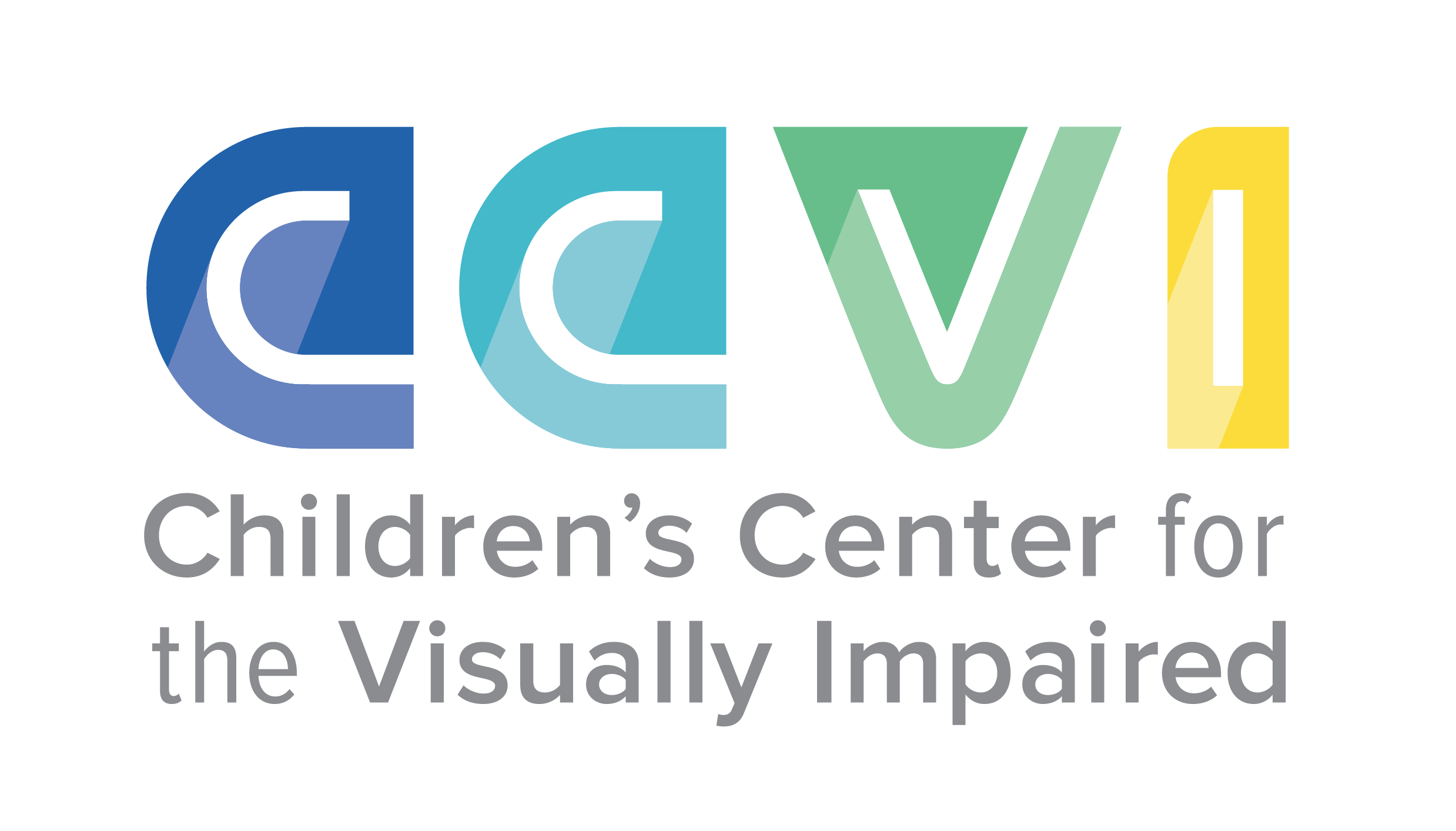CCVI offers medically based outpatient PT, OT, and SLP services that are provided separately from any contracted services through IEPs and IFSPs. Outpatient services may be billable to insurance. High quality vision services set CCVI apart from other therapy clinics. Families may have interest in accessing other non-insurance billable services like educational services from teachers of the visually impaired and orientation and mobility specialists. An individualized plan and parent pay agreement can be established.
Service Menu
Outpatient Therapy Services
Speech-Language TherapyBehavioral Health
Out of Pocket Vision Services

Speech-Language Pathology
The Speech-Language Team provides evaluations, consultations, and therapies for children with communication or feeding and swallowing disorders.
The providers you will work with are called speech-language pathologists (sometimes shortened to speech pathologists or SLPs). Speech pathologists help children develop communication skills and assist with speech disorders, language delays, cognitive communication, voice, swallowing and fluency.
After your initial evaluation, your care team will work with you to create a plan for your child’s unique needs. Together, the speech-language pathologist and your family will work towards your child’s goals in therapy sessions and through practice at home.
Evaluation:
Speech-language pathologists can conduct evaluations, including:
Speech and language evaluation
Feeding evaluation
Conditions:
- Academic language disorders
- Apraxia of speech
- Autism spectrum disorders (ASD)
- Brain injury
- Cognitive disorders
- Cerebral/Cortical Visual Impairment
- Developmental delay
- Dyslexia
- Fluency disorders (stuttering)
- Hearing loss
- Language disorders (expressive, pragmatic, receptive)
- Orofacial myofunctional disorders
- Pediatric head trauma or neurological injuries
- Resonance and other conditions associated with cleft palate or velopharyngeal dysfunction
- Swallowing
- Voice disorders
- Other visual impairments

physical and Occupational Therapy
Our pediatric physical therapists and occupational therapists provide evaluation, treatment, and consultation.
Staff members specialize in treating pediatric patients' unique physiology, social, and emotional needs. Therapists utilize the latest technology and equipment and also maintain current knowledge through continuing education courses.
Our therapists provide specialized pediatric therapy services that are evidence based and supported by research. This approach ensures every child is receiving the latest, best available services to help reach their highest potential and improve quality of life.
Conditions:
- Amputations
- Autism spectrum disorders
- Balance dysfunction
- Brachial plexus injuries
- Burns
- Cardiopulmonary dysfunction
- Cerebral palsy
- Cerebral/Cortical Visual Impairment
- Conditions requiring the use of special treatment modalities for pain control
- Congenital/acquired amputations
- Cystic fibrosis
- Developmental delay disorders
- Down syndrome
- Feeding disorders
- Gait disorders
- Hand injuries
- Hemophilia
- Juvenile arthritis
- Muscular dystrophy
- Neuromuscular conditions
- Sensory processing/integrative disorders
- Spina bifida
- Spinal defect/spinal cord injury
- Torticollis
- Traumatic brain injuries
- Other visual impairments

steps to outpatient care
It is the parent’s responsibility to understand coverage, eligibility and individual benefits for your child, to prevent unexpected costs. CCVI is an in-network provider of PT, OT, and SLP with several payors and is able to verify benefits and bill these partners. If CCVI is out-of-network with your carrier, services may still be partially reimbursable to you by your insurance company after payment is made by you to CCVI. To learn more from your insurance provider, you will need to contact your carrier and ask for eligibility and benefits pertaining to out-of-network services and the self-submission process. Our organization cannot guarantee reimbursement; however, CCVI can provide payment receipts and therapy codes to families for submission to insurance plans after payment has been made to CCVI for services rendered. Please contact CCVI at (816)841-2284 ext. 2016 to learn more about our services.
-
Give us a call, fill out an interest form, or send us an email! Our mission is to serve families like yours, however that may be! If you are a parent or caregiver of a child with a visual impairment under the age of 21, we provide a consult at no cost to explore the options available for services. Regardless of your interest level in outpatient therapy, this call can serve as a jumping off point for accessing high quality resources.
-
This step is twofold.
A.) We will give you a phone call to discuss your options and collect some general information about your child. You’ll provide your child’s diagnosis (if they have one), your concerns, your potential goals, and medical/educational history. Then, our family navigator team will share resources that we feel may be appropriate, potentially including the need for an initial evaluation for your child.
B.) If interested in Outpatient Therapy, we will schedule two in-person evaluations; however, they can often occur during one collective session. All children will receive a Functional Vision Evaluation, if they do not have a recent one on file. This assesses how the child is using what vision they might have, if any. The second evaluation will depend on which therapeutic discipline (Physical, Occupational, Speech-Language) the child might require to make progress on the goals you have for them and they have for themselves, if they are old enough to express this.
-
If parents or caregivers wish to pursue billing therapies to insurance rather than pay out of pocket, CCVI will conduct a confirmation of benefits with the insurance payer to ensure that the services are covered at a desirable rate for the family. CCVI is in network with Blue Cross and Blue Shield of Kansas City (Blue KC) and MO Healthnet (Missouri Medicaid).
-
All CCVI staff members on your child’s care team will meet to discuss and develop a treatment plan. This will be based around the collective goals of the family and child. We will determine a frequency of services that are appropriate for progress and work with you to schedule sessions at a time that works best for your lifestyle.
-
Therapies will be conducted at CCVI’s center. We ask that you arrive 10-15 minutes ahead of your appointment time. We do have an attendance policy to ensure that we are able to serve as many children as possible. However, we do understand the medical fragility that often is present in children who are visually impaired due to other co-existing conditions. We will strive to work with you and be a valuable partner in helping your child succeed.

